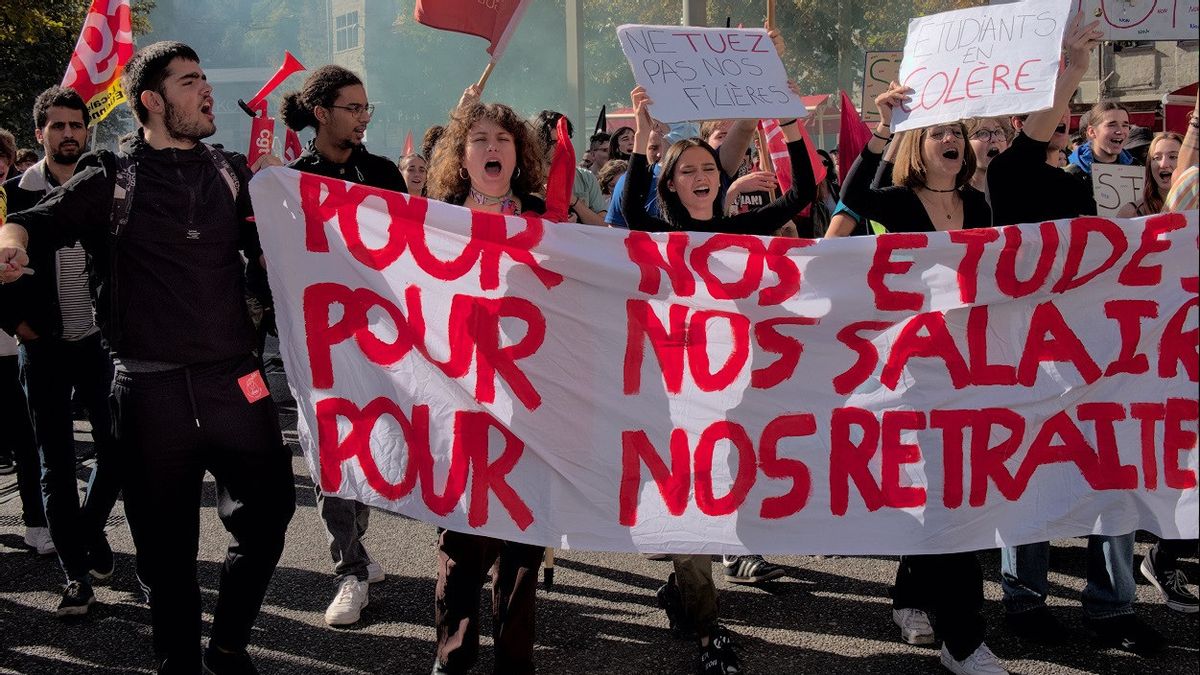JAKARTA - Police fired tear gas and clashed with black-clad anarchists in Paris and across France on Thursday, as hundreds of thousands of protesters opposed President Emmanuel Macron's plan to raise the retirement age.
Entering its ninth day of nationwide protests, which have been largely peaceful, disrupting rail and air travel. Teachers were among the many professions striking out, days after the government pushed for legislation to raise the retirement age by two years to 64.
The demonstrations in central Paris were generally peaceful. However, the "Black Block" anarchists smashed shop windows and street furniture, and entered fast food outlets. Clashes ensued as riot police repelled the anarchists with tear gas and stun grenades.
Interior Minister Gerald Darmanin said 149 policemen were injured and 172 people were arrested across the country. Dozens of protesters were also injured, including a woman who lost her thumb in the Normandy city of Rouen.
"There are thugs, often from the left, who want to bring down the state and kill the police," Darmanin said after visiting the Paris police headquarters on Thursday evening, reported Reuters, March 24.
Small groups continued to clash with police in Paris late into the night, setting fires throughout the city center and playing cat and mouse with security forces.
Police also fired tear gas at protesters in several other cities, including Nantes and Lorient in the west, Lille in the north, and used water cannon against protesters in Rennes in the northwest.
Unions fear the protests could turn violent if the government doesn't heed growing popular anger over pension restrictions.
"This is a response to the lies expressed by the president and his incomprehensible stubbornness," said Marylise Leon, deputy secretary general of the CFDT trade union.
"Responsibility for this explosive situation lies not with the unions, but with the government," she said.
Unions called for regional action over the weekend and a new nationwide strike and protest on March 28, the day England's King Charles III of England will travel to Bordeaux from Paris by train.
The main entrance to the Bordeaux Town hall was torched on Thursday, days before the king was due to visit the southwestern city.
On Wednesday, President Macron broke his weeks of silence over the new policy, insisting that the law would come into effect by the end of the year. He compared the protests to the storming of the US Capitol on January 6, 2021.
Previously, opinion polls had shown a majority of voters opposed the pension law. Anger ran high last week, when the government forced changes through the lower house of parliament without a vote.
The French Interior Ministry said 1.089 million people protested across the country, including 119.000 in the capital which was a record since protests began in January. Meanwhile, the CGT Union said 3.5 million people demonstrated across the country, matching the previous record high on March 7.
"I came here because I am against these reforms and I am really against the fact that democracy doesn't matter anymore," Sophie Mendy, an administrative medical worker told Reuters at a rally in Paris.
"We are not represented and we are fed up," he said.
Protests also targeted oil depots and blocked a liquefied natural gas terminal in the northern city of Dunkirk. Rotating strikes at oil depots and refineries have caused fuel shortages in southeastern and western France.
Protests against the new law, which also accelerates plans to increase the number of years of work needed to earn full pensions, have drawn large crowds in union-organized demonstrations this year.
The past seven nights have been marked by demonstrations in Paris and other cities with burning trash bins and clashes with police. It is the most serious challenge to President Macron's authority since the "Yellow Vests" revolt waged by disaffected low-income communities four years ago.
BACA JUGA:
"The street has legitimacy in France. If President Macron can't remember this historic fact, I don't know what he's doing here," said Willy Mancel, a protester in Nantes.
With high inflation, workers couldn't afford to lose many work days on strike, so the government hoped the strike would eventually lose steam.
Labor Minister Olivier Dussopt said the government did not deny the problem existed, but wanted to move forward. It's not clear how that could happen.
Separately, Laurent Berger, the head of the moderate CFDT union, opened the door to possible discussions but said the government had to make its mark first.
The English, Chinese, Japanese, Arabic, and French versions are automatically generated by the AI. So there may still be inaccuracies in translating, please always see Indonesian as our main language. (system supported by DigitalSiber.id)


















